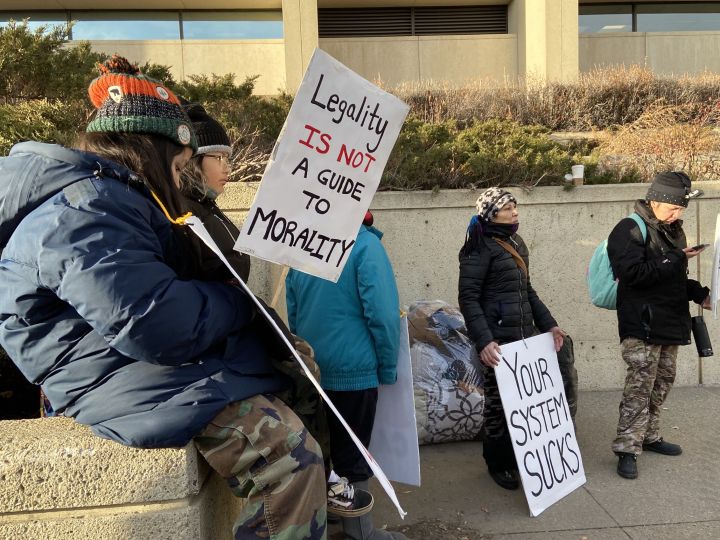A court in Edmonton heard evidence Monday about whether to extend an emergency interim injunction granted late last week that briefly postponed the removal of homeless camps, says a lawyer for a human rights group that’s been fighting the removals.

After two court sessions and hours of discussions behind closed doors, a decision was made over a plan to remove eight high-risk encampments in Edmonton.
The City of Edmonton, Edmonton Police Service and the Coalition for Justice and Human Rights came to a resolution late in the afternoon.
The coalition requested an injunction last Friday over concerns around the large magnitude of encampment structures EPS planned on dismantling in a short period of time before Christmas.
The coalition had previously applied for an injunction to stop the removals, pending a lawsuit it’s launched against the city’s encampment removal policy.
The injunction was extended until that application is heard on Jan. 11, 2024, but police are allowed to remove the eight high-risk encampments before the holidays, as long as officers follow provisions all three parties agreed upon in court.
Moving forward, the city and officers must make sure there is enough shelter space to accommodate homeless people before taking an encampment down. They also need to notify the encampment residents, as well as social agencies, in advance.
Police said the these additional steps will slow their process of taking down encampments and understand the reaction this sparked because it’s around the holidays.
At least a dozen protesters could be seen outside the Edmonton Law Courts on Monday chanting “stop the sweeps” and “fight poverty, not the poor.”
Chris Wiebe, who is co-counsel representing the Coalition for Justice and Human Rights, previously said a postponement granted Friday only extended until noon Monday, so there was urgency.
“‘Emergency interim interim’ is what we’re calling it,” Wiebe said in an interview Sunday about the granting of the short injunction.

Get daily National news
But Wiebe says city police on Thursday informed a committee of social agencies that work with the homeless about their plan to remove a number of encampments starting Monday morning, and that police asked the groups to stay away during the removals.
The Edmonton Police Service has argued in earlier documents submitted to the court that the camps pose a fire risk, Wiebe said.

The Bissell Centre, an Edmonton agency that supports low-income and homeless people, said in a statement posted on social media that people in the camps have limited options.
“Freezing temperatures are a reality for people who have to stay outdoors all night. This can lead to grave outcomes like hypothermia, amputations and loss of life. For some people, staying outside all night is the only safe option,” the centre posted Friday after the emergency interim injunction was granted.
“(The removals) will disproportionately affect Indigenous people and negatively impact our community’s efforts towards reconciliation.”
EPS did not respond to requests for comment on Sunday.

Mayor Amarjeet Sohi said in a statement Friday night that the “scale and timing” of the planned encampment response on Monday was “concerning,” noting he found out about it Thursday night.
Sohi said he had immediate concerns about how vulnerable people would be supported, and said he has been advised the city isn’t leading the response, but has only been asked to provide cleaning services.
“The City of Edmonton endeavors to take a balanced approach based on the assessments of risks to individual encampment residents, the community and the public,” Sohi’s statement said.
“Given the number of people potentially impacted in this case, I am worried about how displaced people may take shelter in other spaces that are not safe or appropriate.”
Edmonton police spokesperson Cheryl Voordenhout said in an email Sunday that the social agencies were notified of the removals to “engage their assistance, not prevent them from supporting people who need help.”
“Service providers were asked to remain out of the immediate worksite for their safety. Police are involved with these encampments because they have been assessed and deemed to be high-risk encampments,” Voordenhout said.

Homeward Trust Edmonton, an organization working to end homelessness, said about 3,080 people were experiencing homelessness in the provincial capital as of early November — 521 more than the same time last year.
A 54-year-old man and a woman believed to be in her 20s died in encampment fires during the first weekend of November.
Edmonton police spokesman Scott Pattison said last month that more than 14,000 complaints against encampments had been made to the city in 2023. As a result, 4,500 camps were investigated and responded to.
— With files from The Canadian Press’ Jamin Mike and Lisa MacGregor, Global News



Comments
Want to discuss? Please read our Commenting Policy first.